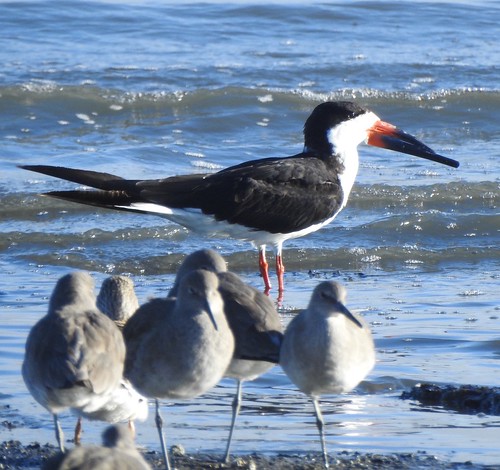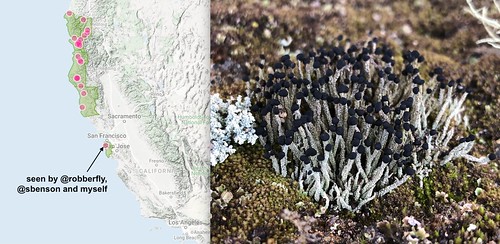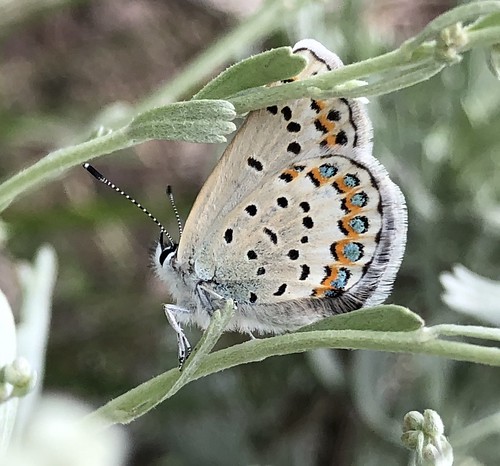2018 Big Year Wrap
For quite some time I’ve been curious to learn our native fungi in California. Friends would bring foraged Chanterelles over to make beautiful dinners. Amazed by the idea one could stumble upon their orange fringes pushing up out of oak duff, I wanted to wander the East Bay hills to see this myself. Many people likely share my experience of our outdoor education ignoring this area of ecology, instead focusing on the fear of mushrooms. When a (minor) health requirement to get more exercise popped up, I figured coupling hiking with extended study was the ticket. If anyone has tried to hike with the granddaddies of California fungi field guides*, you’ll understand the allure of iNat + smartphone right away.
The speed of learning with iNat in my back pocket is outstanding. The rate is even faster now with the addition of the AI engine this year. It took a little longer for me to recognize the real strength of iNat is the facility to communicate with others interested in the same areas as yourself. In the few years since beginning with this platform, I’ve come to cherish the friendships that have happened out in the field looking at first fungi and then, well- everything.
For 2018, here are the year’s highlights:
-- Eastern Sierras Butterfly Counts (3 of them!) with @robberfly, @maractwin and @sea-kangaroo as amazing naturalists to be with in the field. The trip was so epic, it’s difficult to summarize it. (Who knew Sponch was a food?)
Thank you Liam for all the hard work, coordination, deep expertise and balletic netting you selflessly offered. The number of really beautiful Speyeria, Lycaenidae and Hesperiidae up there are incredible. Being able to participate helped me to better understand the range of Lepidoptera biodiversity within our state. At the same time, I got introduced to some crazy cool vascular plants that @jdmore identified (no, I wasn’t distracted while counting leps). Also incredible was to spend time looking at tiger beetles with @storm_petrel and moths, odonates with @euproserpinus
-- Showing my dad @caliche_kid how iNat works. He’s been able to contribute both IDs and obs for his corner of Texas.

-- A big day out with some of the most amazing birders the Bay Area has to offer. @gyrrlfalcon, @dpom and Doug showed me a lifer Black Skimmer. What a beak.
-- Getting a rapier-thin chemise twig up my nose while recording lichen density in burn areas. That hurt like the dickens. I don’t recommend it unless you like nose bleeds that don’t stop.
-- Bioblitzing Sequoia NP to help expand their species list. In particular we were able to assist with moths, lichens and mosses. @nicetim expertly set up the blitz and @damontighe, @kkellman were excellent trail partners.

-- Range extensions for iNat for at least two species, Niebla homalea and Pilophorus acicularis
-- Sampling for researchers - Galerina, Gilia and Niebla were a few of the species of interest I could help be extra eyes for.
-- Helping spread the gospel of lichens.
-- Moth lighting with @damontighe ‘s easy to transport kit. My kit made it all over California and to central Texas. If you are interested- here is his setup:
https://calnature.org/blog/2017/9/27/diy-moth-light

--A fun, friendly and educational leaderboard slog. I was curious to see how many California species I could see in a year. There are thousands of named species calling our state home and somehow I managed to see 2,886 of them. @robberfly, @damontighe and @sea-kangaroo were hugely supportive loyal companions in this big year. By helping each other look at what was around us, we all learned so much about the world.
-- And most importantly, spending outdoor time with incredibly knowledgable people, learning from them and enjoying what it means to be here, in our beautiful environment, trying to understand what biodiversity means in this critical time. I can’t thank enough everyone already mentioned and @leslie_flint @sbenson @kueda @tiwane @merav @rebeccafay @leptonia @mrchasse @euproserpinus (apologies if I’ve accidentally left someone off.)
What does 2019 offer?
-- Spending more time in Texas which means maybe I’ll learn something about insects since they have so many there.
-- I started looking at Arctostaphylos as a group and would love to spend more time with them.
-- Who’s up for Le Grand Tour of Calochortus?
-- And lastly, I’m really going to tackle Eriogonium. Oh, and yeah- bryophytes.
See you out there,
Cat
*The excellent texts- David Arora’s Mushrooms Demystified
https://www.goodreads.com/book/show/415949.Mushrooms_Demystified
and
Dennis Desjardin, et al
California Mushrooms: The Comprehensive Identification Guide
http://www.californiamushrooms.us
If you are looking to purchase a fungi field guide, I highly recommend Siegel and Schwarz,
Mushrooms of the Redwood Coast: A Comprehensive Guide to the Fungi of Coastal Northern California
https://www.redwoodcoastmushrooms.org/





Comentarios
Congratulations on a monumental year! It's been a pleasure to be a small part of it.
Great year, Cat, it's been nice to hang out with such a cool neighbor and frustrate you with top-down-only shots of flowers.
Agregar un comentario